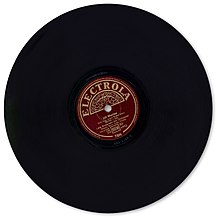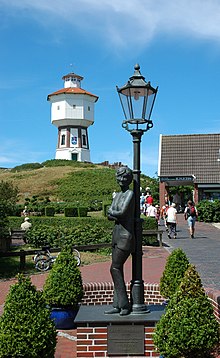Lily marleen
Lili Marleen is a famous German song, whose music was composed in 1937 by composer Norbert Schultze based on a poem that a soldier named Hans Leip had written in 1915, during the First World War. The song, premiered in 1939 by Lale Andersen, became extremely popular during World War II and was translated into a large number of languages, becoming a military march, a military sports song or simply a barracks chant depending on the country. Rainer Werner Fassbinder directed the film Lili Marleen (1981) about the singer's story, based on her autobiography.
History

The German soldier Hans Leip, after being assigned to the Russian front during World War I, composed a poem in which he remembered his girlfriend, Lilí, the daughter of a grocery store in his hometown, and in which he narrated how they both said goodbye under a lamppost next to the gate of the barracks. According to some, the second part of her name was taken from a friend's girlfriend, while according to others it was the name of a young nurse he would have met at her sentinel post.
Leip's poems were published in a collection in 1937 and caught the attention of the composer Norbert Schultze (Brunswick, 1911-October 17, 2002), already by then a renowned author whose compositions had been very well received by German critics and audiences. Leip's poem was entitled Das Lied eines jungen Soldaten auf der Wacht ('The Song of a Young Soldier on Duty'), and Schultze set it to music later that year under the name Das Mädchen unter der Laterne ('The girl under the lamppost') and not with the one who has gone down in history.
The song was released the following year, performed, although at first she refused to do so, by the famous singer Lale Andersen but at first it was not successful, selling only 700 copies of the album. However, two years later, in 1940, at the start of World War II, a non-commissioned officer from a German armored reconnaissance company who had the record played it one day at an informal meeting in the barracks and his colleagues liked it so much that it was adopted as the company's song. The group was assigned in the spring of 1941 to the North African front, forming part of the Afrika Korps, the army corps commanded by Field Marshal Erwin Rommel.
One of the company's officers, Lieutenant Karl Heinz Reintgen, had previously been assigned to Belgrade (Yugoslavia) to take charge of the military radio station in this city and took with him the Lilí's record Marleen. From there he broadcast the song for the first time on August 18, 1941, dedicating it to his companions who were in the North African desert. Rommel liked the composition very much and asked that it be included regularly in radio broadcasts. It began to have great success and requests came from all fronts for it to be broadcast, so the station began broadcasting it every day at 9:57 p.m., as the closing of its programming. Due to the power of the station, Allied soldiers also heard the song and the theme was adopted on both fronts. Thus, the German soldiers were surprised when taking enemy prisoners found that they knew the song.
The song's success caught the attention of Propaganda Minister Josef Goebbels. After listening to it, his sentence was negative, since he considered that it could only negatively influence the morale of the troops and ordered that it be removed from the station's repertoire. The protests of the soldiers were such that Radio Belgrade had to keep it on the air, despite the opinion of the Minister, and it continued to be broadcast every night.
Interpreters during the war
Before the end of the war, the song was translated into other languages and was sung by various singers, both men and women, becoming the most popular war song known to date.
In German, in addition to Lale Andersen, it was performed by Willy Fritsch, the Heyn Quartett, the Wehrmacht Choir and Mimi Thoma.
In English it was sung by Lale Andersen herself in 1942. In 1943, the BBC broadcast a parody version against Hitler sung by Lucy Mannheim and with the same music by Schultze but with lyrics, reduced from five to four stanzas, author unknown. In 1944 it was sung by Anne Shelton and later by Vera Lynn, whose version was broadcast from the BBC in London in transmissions for the Allied army. The British Eighth Army adopted the song, which began to be sung in barracks and military hospitals. That same year, the version by singer Perry Como ranked number 13 in the United States.
In 1945, the actress and singer Marlene Dietrich also recorded a version in English, which she quoted in the film Winners or Losers (1961) and which became one of the classic songs in her repertoire during his shows as a singer over the course of 20 years (1953-75).
In French it was sung by Suzy Solidor; in Italian by Milly and Meme Bianchi; in Hungarian by Ilona Nagykovácsi; in Finnish by Georg Malmsten (1942) and in Danish by Lou Bandy (1942).
Letter
The original lyrics in German by Hans Leip are as follows:
The lyrics translated into Spanish:
Later versions and impact
After World War II, the already very popular song was adopted by a large number of armies around the world, in a sung version or adapted as a march. In some cases the text was translated and in others it was adapted with new letters in accordance with the military reality of each army. Thus, among many others, there are versions in German, Danish, French, Spanish, Estonian, Italian, Polish, Latin, Finnish, Russian or Hungarian. It is said that it could have been translated into more than 48 languages. The Bear Family record company issued a seven-CD box set containing 195 covers of the song.
As for the song's success, Lale Andersen, referring to why it was so loved by soldiers on both sides during the war, poetically said "Can the wind explain how it became a storm? ”.
In 1980, German director Rainer Werner Fassbinder directed a heavily fictionalized film version of the Lili Marleen story, starring Hanna Schygulla and Giancarlo Giannini.
Spanish versions
Already during World War II, Lili Marleen was covered in Spanish by the soldiers of the Blue Division.
Subsequently, many pop and rock music groups have recorded it, such as Olé Olé (1986), Derribos Arias or the punk-rock group Interterror, which in 1983 published an irreverent adaptation of the song that was It became his biggest hit. In 2007, another Spanish punk group, Los Muertos de Cristo, of anarchist ideology, included a version of the song in what was their last studio album, Rapsodia Libertaria. Volume II. The band Ni Por Favor Ni Ostias, also a punk, used an instrumental version of the song as an introduction to some of their concerts, which they later recorded on CD. The group Arma Blanca also plays a version of the song, as well as Prisoner No. 7 on the album Somos como somos (2008). Withdrawal Syndrome they performed a song on the subject called Adiós Lili Marlen. And for several years now, the concerts by the Spanish Joaquín Sabina have usually included a few verses of the theme, sung by Pancho Varona, as a preamble. In 2009, the final titles of the film Bad Day for Fishing played a version made by the Uruguayan group Sybilla Vaine, with the singer of Buenos Muchachos, Pedro Dalton, as a guest. The same group would do a new version on their debut album. The Galician film Crebinsky (2011) includes a version of the song in Spanish.
Contenido relacionado
Opera station
Capsule
Gioachino Rossini
